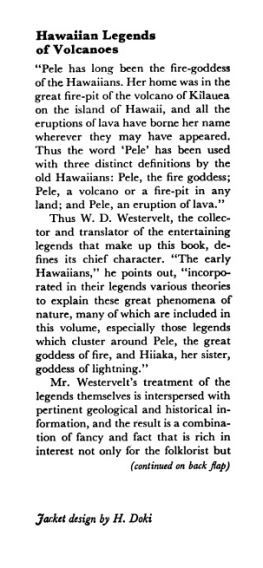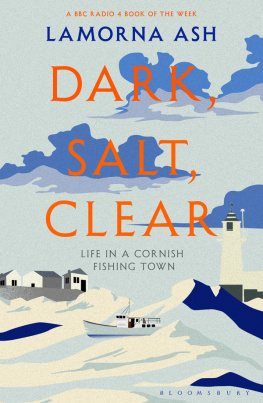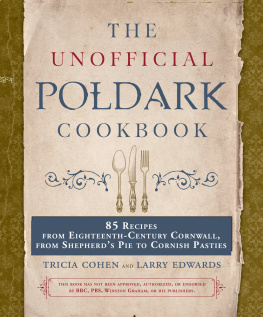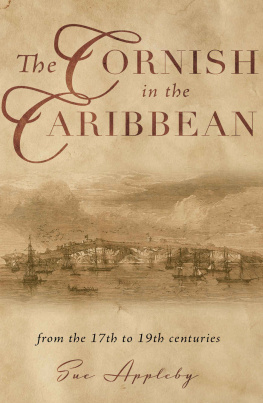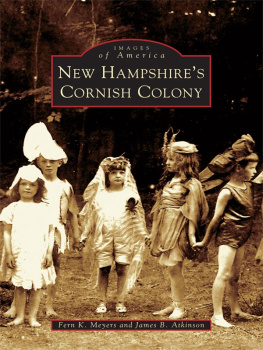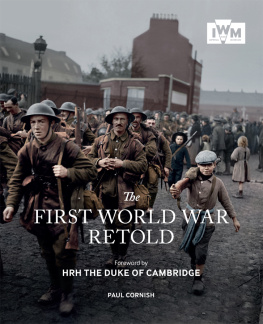William Bottrell - Traditions and Hearthside Stories of West Cornwall, Vol. 1
Here you can read online William Bottrell - Traditions and Hearthside Stories of West Cornwall, Vol. 1 full text of the book (entire story) in english for free. Download pdf and epub, get meaning, cover and reviews about this ebook. year: 2016, publisher: CreateSpace Independent Publishing Platform, genre: Science. Description of the work, (preface) as well as reviews are available. Best literature library LitArk.com created for fans of good reading and offers a wide selection of genres:
Romance novel
Science fiction
Adventure
Detective
Science
History
Home and family
Prose
Art
Politics
Computer
Non-fiction
Religion
Business
Children
Humor
Choose a favorite category and find really read worthwhile books. Enjoy immersion in the world of imagination, feel the emotions of the characters or learn something new for yourself, make an fascinating discovery.

- Book:Traditions and Hearthside Stories of West Cornwall, Vol. 1
- Author:
- Publisher:CreateSpace Independent Publishing Platform
- Genre:
- Year:2016
- Rating:5 / 5
- Favourites:Add to favourites
- Your mark:
- 100
- 1
- 2
- 3
- 4
- 5
Traditions and Hearthside Stories of West Cornwall, Vol. 1: summary, description and annotation
We offer to read an annotation, description, summary or preface (depends on what the author of the book "Traditions and Hearthside Stories of West Cornwall, Vol. 1" wrote himself). If you haven't found the necessary information about the book — write in the comments, we will try to find it.
Traditions and Hearthside Stories of West Cornwall, Vol. 1 — read online for free the complete book (whole text) full work
Below is the text of the book, divided by pages. System saving the place of the last page read, allows you to conveniently read the book "Traditions and Hearthside Stories of West Cornwall, Vol. 1" online for free, without having to search again every time where you left off. Put a bookmark, and you can go to the page where you finished reading at any time.
Font size:
Interval:
Bookmark:
The work of Mr. Thomas, Mine Surveyor, informs us that from 2,000 to 3,000 tons of stone was frequently cleared from a single acre.
This old Cornish word "Bucca" (still in common use) has various significations, and none very clearly defined. It appears to belong to the same family of words as the Irish "Pooka," and the Welsh "Pwcca." As above, it is often applied to a poor, half-witted person of a mischievous dispositionone about whom there is anything weird or wishtto a ghost, or any kind of frightful apparition, and by association of ideas to a scarecrow. By "Buckaboo", which is probably a corruption of "Bucca-dhu" (black spirit) we mean Old Nick, or one of his near relations. As an example of this, there is a story told of an old lady who lived long ago at Raftra, in St. Levan. The old dame, when more than fourscore, was so fond of card-playing that she would walk almost every winter's night, in spite of wind or weather, to the village of Trebear, distant a mile or more, that she might enjoy her favourite pastime with a family of congenial tastes who resided there. The old lady's step-daughter wished to put a stop to what she regarded as rather scandalous vagaries, as the old dame seldom arrived home before the small hours of the morning; with this intention the young mistress persuaded the serving-man to array himself in a white sheet, &c., so as to personate a ghost that was accused of wandering about a lonely spot over which old madam would have to pass. The winter's night was dark and rainy, when, about midnight, the ghost seated himself on the side of Goonproynter stile, where he had to wait two or three hours. The dear old lady was in no hurry to leave pleasant company, as it was Christmas time. At last she passed Padz-jigga, mounted the stile, and seated herself to draw breath opposite the ghost. Over a while she said, "Hallo! Bucca-gwidden (white spirit), what cheer? and what in the world dost thee do here with Bucca-dhu close behind thee?" This cool address so frightened Bucca-gwidden that he ran off as fast as he could lay feet to ground, the old lady scampering after, clapping her hands, and calling, "Good boy, Bucca-dhu; now thee west catch Bucca-gwidden and taken away with thee!" The ghost was so frightened that he fell in a fit, and was never right in the head after. Then he was a real Bucca in the sense of out Betty's sweetheart, and the strong-minded sociable old lady enjoyed many more years of her favourite pastime with her friends in Trebear.
Another Bucca of the mischievous class lived in St. Just but a short time since, who gave rise to the saying, "Between both, as Bucca said." Being, as usual, loafing about the public-house of a pay-day, when there is more than the ordinary good cheer about, Bucca happened to look into a room where Capt. Chynoids and another gentleman were sitting in the window-seat. The captain said to the intruder, "Which art thee, Bucca, a fool or a rogue." Before making any reply, Bucca placed himself between them, then answered, "I'm, between both, I believe!" Another day he was idling about a new shaft that two men were engaged in sinkingone filling the kibbal, the other winding up the stuff with a hand-winze. The man to grass told Bucca to take hold of the winze and wind up a few kibbals whilst he lighted his pipe. Bucca wound up two or three alright. When the next kibalful was near the top of the shaft he called out, "Hold on there below while I spit on my hands a minute!" Down went the kibbal, winze and all, smash, and half killed the man below. Bucca took to his heels, crying, "Triz wiz, triz wiz; whipper-snapper, catch me if thee cust (canst)."
Another trick of the Bucca was to watch when the women put a nice bit of cake to bake that they might have a comfortable cup of tea before the good men came home from work. They would be sure to go out to coursey (gossip) a bit while the cake was baking. Then Bucca would steal in, carry off the cake, and place a turf under the bake-pan carefully covered with fire again. When the gossip came to take up the nice bit, she might be heard to exclaim, "Well, I never thought I'd been out so long; my cake is burned to ashes!"
From One and All for June, 1868, we extract the following article on the antiquity of the term "Bucca:"
"Most people in this neighbourhood are probably aware of the comparative estimate made of themselves a long time ago by the boys of Newlyn:
'Penzance boys up in a tree,
Looking as whist as whist could be;
Newlyn Bucks as strong as oak,
Knocking them down at every poke.'
Evidently youthful Newlyn once considered that to be a 'bucka' was a matter for pride and congratulation. And youthful Newlyn was correct. 'Bucka' was once a divinity, but, being older than English Christianity, it became degraded from that high rank as the new religion came westward.
"Nevertheless, Bucka did not die. Within easy memory every boat in Newlyn always set aside a portion of the catch, and left it in a collected heap on the beach to propitiate 'Bucka;' and every fisherman noted, with superstitious awe, the remarkable regularity with which 'bucka' fetched away his offerings, after dark. Nowadays, youthful Newlyn, and aged Newlyn too, decidedly object to be known as 'bucka'. The name of the great divinity has become a term of reproach.
"The derivation of the word is not the least curious thing about it. The name given to the Supreme Being, amongst all the Latin races, follows the type of 'Deus.' Amongst the Teutonic nations (including Anglo-Saxons), the type word is 'Gott;' whence our English word 'God.'
"Amongst the Sclaves (Russian, Bohemian, Serbian, &c.), it is 'Bog;' whence the Gaelic 'bogie,' the Celtic 'bo,' the slang English 'bogy,' and the Newlyn 'bucka;' but these two last having fallen among Teutonic thieves, were robbed of their divinity and turned adrift as disreputable devils. 'Bo,' too, has met with no better fate. The name of this terrible divinity is now proverbially one which a man must be very timid indeed not to be able to use to frighten a goose.
The "red-haired Danes" have continued a source of terror and a name of reproach to the present day. On the 1st of this month a Long Rock quarrel was the subject of a magisterial inquiry at the Penzance townhall, when it was proved that the defendant, Jeffrey, had called one of the complainants, Lawrence, who has rubrick hair, a "red-haired Dane." In Sennen Cove, St. Just, and the western parishes generally, there has existed, time out of mind, a great antipathy to certain red-haired families, who were said to be descendants of the Danes, and whose ancestors were supposed, centuries before, to have landed in Whitsand Bay, and set fire to, and pillaged, the villages. Indeed, this dislike to the Rufus-headed people was carried so far that few families would allow any member to marry them, so that the unfortunate race had the less chance of seeing their children lose the objectionable tinge of hair.
As the name "Vellandruchar" means "wheel-mill," the mill which was formerly in this place was probably one of the oldest in the west. At no great distance from Vellandruchar is the site of another ancient mill called Vellandsager. This name is equally suggestive, as denoting that the serging or bolting apparatus was not then common in the mills. These old mills were situated in the lower part of Burrien on the stream which divides that parish from Paul. According to tradition, a sanguinary battle was fought on the moors little above Vellandruchar, between Arthur and the Danes, when they say the mill was worked with blood, and that arrow-, spear-, and axe-heads, with remains of other weapons, have frequently been found in the bog-turf (peat soil) which is cut for fuel from Vellandruchar moors. These moors were also said to be so much infested with adders, in old time, that cattle could not be turned into them in summer, until one day an adder got into a pot of milk, which a man who was cutting turf on the moor brought with him to drink. The man placed a turf on the mouth of the pot, and stopped the adder in it. In a short time the imprisoned adder made a peculiar noise, which attracted other adders round the pot. These, in turn, seemed to call others, until from all parts of the moors the adders were seen directing their course straight to the interesting captive. The men cutting turf on the moors were all obliged to flee the low grounds. Towards night, when they ventured into the moor, they found that a mass of adders, as large as an ordinary haycock, had interlaced themselves into a solid heap over and around the pot. The people then formed a ring of dry furze, and other fuel they found ready cut, around the mass of adders, now apparently torpid. When many scores of trusses of furze were collected, fire was placed at the same instant to several parts of the ring of furze. They say that the noise made by the burning adders was frightful, and that a great number of milpreaves were found in the ashes.
Font size:
Interval:
Bookmark:
Similar books «Traditions and Hearthside Stories of West Cornwall, Vol. 1»
Look at similar books to Traditions and Hearthside Stories of West Cornwall, Vol. 1. We have selected literature similar in name and meaning in the hope of providing readers with more options to find new, interesting, not yet read works.
Discussion, reviews of the book Traditions and Hearthside Stories of West Cornwall, Vol. 1 and just readers' own opinions. Leave your comments, write what you think about the work, its meaning or the main characters. Specify what exactly you liked and what you didn't like, and why you think so.

